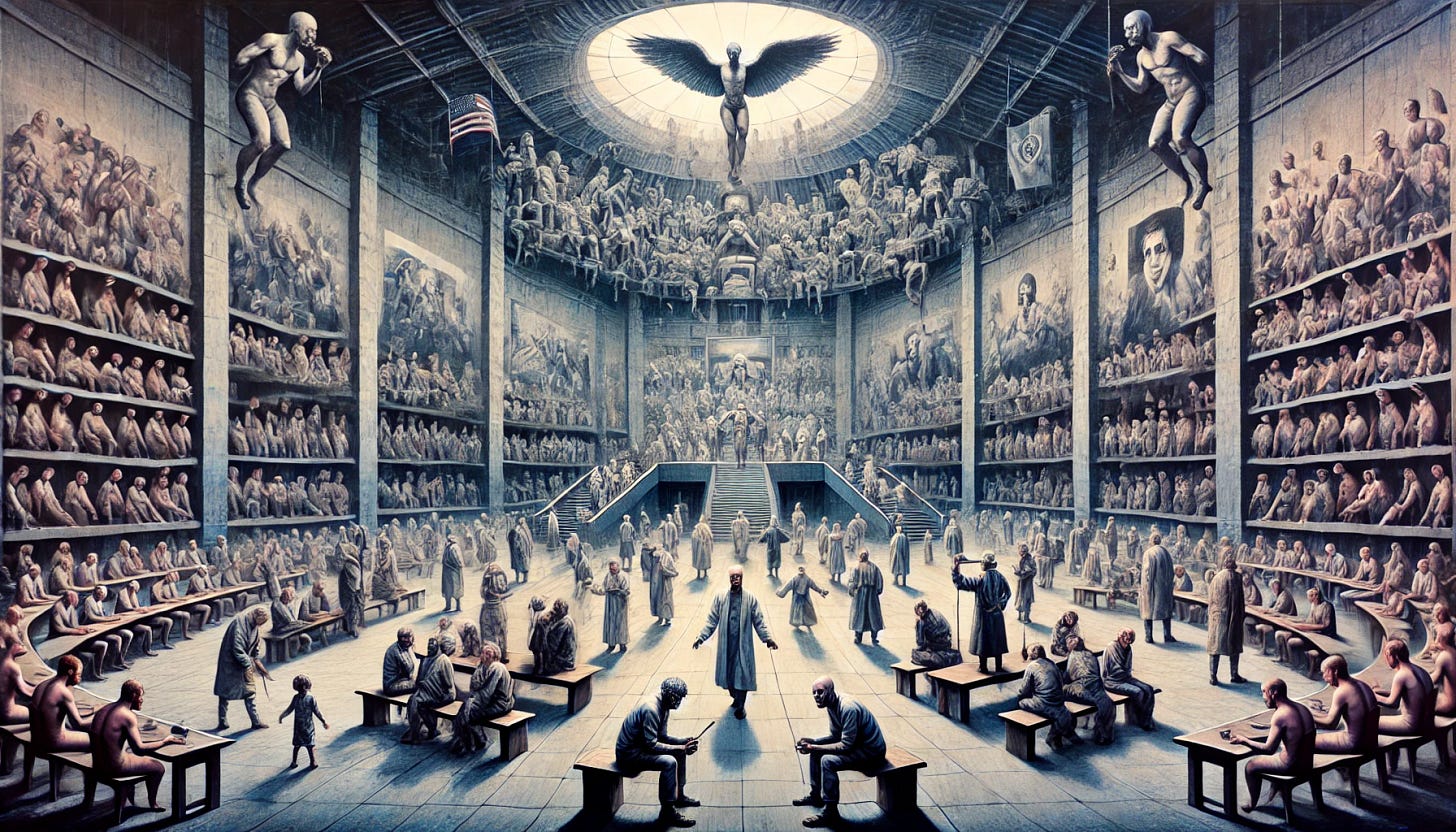
About a decade ago, I noticed a dangerous shift taking place. It was actually at the same time as I developed an interest in politics.
A Shift in Perception
I noticed that what used to become accepted, through as multi year process of subtle changes, a time tested technique to adjust and change what the masses considered accepted and what not, had accelerated significantly. As if there was a rush towards an end. As if there was a threat that these changes wouldn’t take place.
Today we are reaching extreme radicalization with some important definitions shifting. For example, I used to consider myself in the middle of the political spectrum, in between conservatives and socialists. I know they have different perspectives, but both necessary to keep the balance in the political realm and in life in general. Both sides have their rights and wrongs, and both sides are necessary for our society to progress. Some adhere more to one side and some more to the other and that’s fine. Both should be able to coexist and in fact complete each other.
However, within this one decade, things have been pushed to the edges. I am now considered to be ‘far right’ just by holding some basic beliefs, like for example the importance of family or believing in God.
The definition of "far right" has evolved significantly over time, but this evolution is part of a broader pattern where political ideologies on both sides of the spectrum have experienced shifts in how they are perceived.
What was once considered "normal right" has increasingly been labelled as extreme or abnormal. At the same time, some ideas that were once considered fringe on the left have gained greater acceptance and have moved closer to the centre of political discourse.
This process can be understood using the concept of a shifting window (called the Overton window). The Overton window describes the range of ideas tolerated in public discourse. As fringe ideas are brought into mainstream discussion, the window shifts. This shift makes previously unacceptable ideas seem more reasonable or mainstream by comparison, pushing the boundaries of what is considered normal.
I am sure that is now clear how mainstream media coverage and social media platforms play a significant role in normalizing fringe ideas.
Sensationalist coverage of extreme positions, even if critical, can give them a platform and legitimacy. And then we have the social media algorithms that prioritize engagement which can help normalize or amplify radical views – depending on what the goal is.
As a result we can clearly see today insane ideas becoming accepted since media present them as normal, and normal ideas becoming insane since media label them, as for example the frequently used ‘far right’.
Today media (both mainstream and social media) have unprecedented power. They can literally define new rules and direct the masses to abandon old ones at a speed that was unheard before.
An Attack on Freedom of Speech

This manipulation and propaganda has taken a dangerous new turn, steering us toward a dystopian future that many great minds of the past have foreseen. Compared to where technology is leading us, George Orwell's "1984" might one day feel like a children's story.
The most outrageous aspect is that these efforts are being made in the name of freedom, as those in power seek to control speech by labelling anything that challenges the mainstream narrative as divisive or hate speech.
So while we are kept fighting each other instead of uniting, those who control the narrative proceed with their agendas of central power and control.
This trend is evident not only in the UK through the recent events, but also in countries like Australia, where the boundaries of free speech are being increasingly restricted under the guise of protecting society.
True free speech, however, is the ability to listen to opinions you disagree with, coexist with those who hold different views, and engage in meaningful debate.
Disagreement should not be met with offense but rather with open discussion and a willingness to understand other perspectives.
Unfortunately, many people today seem unable or unwilling to accept differing views. Instead of engaging in dialogue, they hide behind screens, keyboards and fake names, afraid to confront opposing opinions directly. Some, particularly those with wealth and power, resort to using lawyers to initiate unnecessary legal disputes, further stifling open discussion.
This growing trend of avoiding meaningful discourse, either out of fear or convenience, is eroding the foundations of free speech.
If we continue down this path, we risk losing the very essence of what it means to live in a free society—where differing opinions are not just tolerated but encouraged as a means of progress and understanding.
The Western Society is Becoming a Large Psychiatric Institute
What we are witnessing today increasingly resembles a vast psychiatric ward, where behaviours that were once considered fringe or abnormal are now accepted as the new normal. The Overton window—the range of ideas tolerated in public discourse—continues to shift, accommodating ever more extreme and divisive viewpoints. This trend is not just a fleeting phase; it is leading us toward a future of growing polarization and societal fragmentation.
As these extremes become more pronounced, it seems inevitable that an explosion of unrest will occur.
Why? Because the majority's concerns are being ignored, while minorities are prioritized in ways that destabilize societal harmony. The recent riots may only be a precursor to what lies ahead, especially as institutions like the World Economic Forum (WEF) continue to influence these dynamics.
Narcissism, sadism, and various addictions are increasingly normalized rather than treated. Abnormal sexual behaviours and mental illnesses are no longer addressed as issues requiring intervention but are instead celebrated or simply accepted as part of a broader societal decline. Dishonesty, denial of reality, passivity, and other destructive traits are on the rise. Individuals now find a twisted pleasure in inflicting pain on others, often through insults, belittlement, and other forms of psychological abuse.
This sadistic behaviour not only reveals a deep-seated unhappiness but also reflects a moral decay that has taken root in our society.
Such actions are not just harmful to those targeted but also indicative of the inner turmoil and dissatisfaction that these individuals project onto others in a toxic and damaging way.
In essence, what we are seeing is a society in moral and psychological decline, where the lines between right and wrong, normal and abnormal, have been blurred beyond recognition. If this trajectory continues unchecked, the consequences could be dire, with the potential for widespread societal breakdown and unrest.
What’s next?

What we are witnessing today is far from random; it is part of a larger, orchestrated plan. There are clearly instigators behind the chaos, and it seems that the age-old strategy of "divide and conquer" is once again at play. But why is this happening, and what is the solution?
If we assume that this is indeed a result of a deliberate divide-and-conquer strategy, then it stands to reason that the solution might also come from the same forces that created the problem in the first place.
However, I’m not referring to the pawns and the masses, who have historically been manipulated to achieve certain goals. I'm talking about the puppet masters—the unseen forces that pull the strings behind the scenes.
The riots and the deepening divisions that have been exaggerated and accelerated in the wake of COVID-19 can be addressed in two fundamental ways. One approach is to educate, understand, and change the very foundations of our society, fostering unity and resilience against manipulation. This would require a massive shift in public consciousness and the empowerment of individuals to think critically and act collectively for the common good.
Alternatively, as Klaus Schwab of the World Economic Forum (WEF) has ominously stated:
"If we do not improve the functioning and legitimacy of our global institutions, the world will soon become unmanageable and very dangerous."
This statement hints at a top-down solution, where the same global institutions that contributed to the current crisis propose to 'fix' it—leading to even greater control and centralization of power.
Moreover, Yuval Noah Harari, a prominent contributor to the WEF, has warned of a future where technology and society advances to the point that we will have a "useless class" of people. And these will be ordinary people who simply want to live their lives outside a dystopian future that Harari presents as positive.
This unsettling vision suggests that those who cannot keep pace may find themselves increasingly marginalized, further exacerbating societal divisions.
In this context, the question remains: will the solution to these growing challenges come from a grassroots movement of education and empowerment, or will it be dictated from above by those who have a vested interest in maintaining control?

The answer to this question will likely shape the future of our society, determining whether we move toward greater freedom and unity or deeper division and authoritarianism.
It all depends on each one of us. Passivity is not an option anymore.


